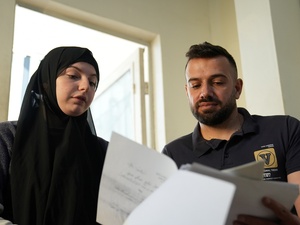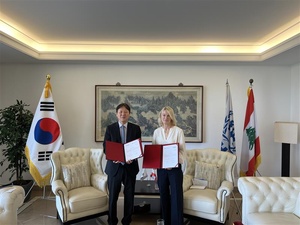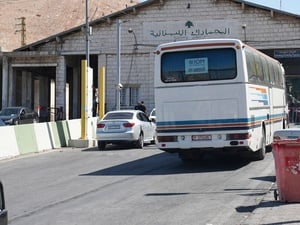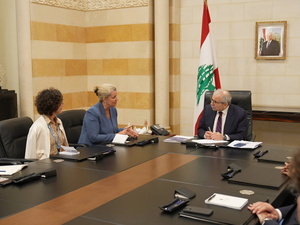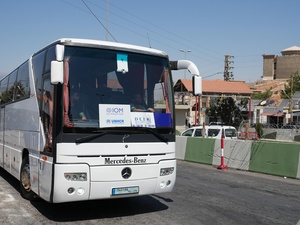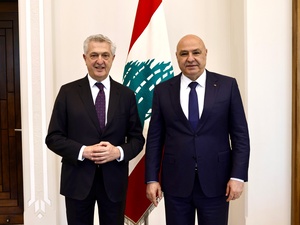Solid fuel, solid hope: how sustainable energy brings together refugees and Lebanese
Solid fuel, solid hope: how sustainable energy brings together refugees and Lebanese

In Lebanon’s Bekaa Valley, Syrian refugees and Lebanese communities work together turning agricultural waste into sustainable energy and shared hope, thanks to Denmark’s support.
Implemented by UNHCR with the support of Denmark, a new source of hope has emerged in the heart of the Bekaa Valley, where displaced Syrians and their Lebanese neighbors are working side by side in biomass fuel production facilities, providing vulnerable families with a cleaner and more affordable way to heat their homes.
When Trad fled conflict in Syria with his wife and three children, he never imagined that one day he would be helping to build a cleaner, more sustainable future for vulnerable communities in Lebanon. Like thousands of refugees, he had to start over after arriving in the country. Yet an opportunity at a biomass fuel facility in Taanayel offered his family a fresh start.
“The idea was very new to me, but I was eager to learn, I wanted to do something meaningful", Trad recalls. Through on-the-job training, refugees and Lebanese workers learned how to operate heavy machinery and the production of eco-friendly fuel briquettes. With Lebanon facing a deepening energy crisis, the project has significantly reduced reliance on costly and polluting fuels like wood and diesel among vulnerable families in Beqaa Valley.

I use the solid fuel myself; it’s effective, cost-saving. it makes a big difference.”, says Trad proudly
In the facility, Lebanese and Syrian staff collaborate turning agricultural waste into solid fuel—but also building trust, friendships, and a sense of shared purpose along the way. “We’ve learned a lot from each other—not just technical skills, but also how to support and respect one another”, Trad says.

The Danish Ambassador joins Lebanese and Syrian workers in Bekaa, celebrating a project of shared energy, solidarity, and hope.
Before receiving support from UNHCR, the biomass fuel project run by Arc-en-Ciel had been on hold for nearly a year due to a lack of funds to repair or maintain essential machinery. The UNHCR donation of a new production line, including equipment such as shredders, a conveyer belt and a compactor, revived the project, making production significantly easier and improving the quality of the fuel. The upgraded equipment not only made Trad and colleagues’ daily tasks more manageable but also deepened his interest in learning and adapting to new production methods.

Trad operates the machinery at the biomass facility in Bekaa—part of a UNHCR-supported project that empowers refugees and Lebanese workers with new skills while producing clean, affordable fuel for vulnerable families
For Trad, the project’s impact goes beyond today. His dream is to take the skills he has gained and one day establish a similar facility back in Syria, supporting his hometown's recovery and promoting more affordable energy solutions there. “I want to create something that supports vulnerable people and protects the environment at the same time”, he added.
The biomass fuel project stands as a statement of resilience, cooperation, and future possibilities. It also reduces the use of unsafe heating practices—such as burning waste or harvesting wood informally, providing an environmentally friendly, affordable, and safe alternative. At the inauguration ceremony in Taanayel, UNHCR Representative in Lebanon, Ivo Freijsen, noted that the initiative addresses pressing health challenges while providing practical solutions to ease the hardship faced by both refugees and host communities in the winter.
“This project is not only a technical success, but a story of social cohesion and solidarity. It is an example of how refugees can contribute to Lebanese society and economy, when the host communities are open to cooperation. We hope it becomes an inspiration for others in Lebanon as well as other refugee hosting countries”, said the Danish Ambassador to Lebanon, Kristoffer Vivike, during the event.

The biomass fuel project is a component of a longer-standing partnership between Denmark and UNHCR. A new three-year agreement has been signed in 2025
Funded through Denmark's multi-year partnership with UNHCR, the biomass fuel initiative also includes facilities in Temnine el Faouqa, and Qaraoun, with municipalities and local partners gradually taking ownership to ensure long-term sustainability. Over 12,000 vulnerable individuals have already benefitted from the distribution of solid fuel products, a vital contribution especially during harsh winter months.

Over 12,000 vulnerable individuals have already benefitted from the distribution of solid fuel products, a vital contribution especially during harsh winter months.
As Trad continues his work, he represents what refugees can achieve when given the chance and how they can contribute to their communities and to their countries if the situation allows. "This is not just a job," he says. "It's a way to help my family, my neighbors, and hopefully one day, my own country".
UNHCR and Denmark: continued commitment to refugees and host communities
The biomass fuel project is a component of a longer-standing partnership between Denmark and UNHCR. A new three-year agreement has been signed in 2025, allocating USD 13.7 million to support vital protection initiatives such as community-based protection, protection cash assistance, civil documentation, registration, and case management. The project builds on the former programme, "Strengthening social services and reducing gender-based violence risks for refugees and vulnerable Lebanese through community-based protection” which was implemented from 2022 to 2024.
The new partnership “Maintaining the protection environment and well-being of refugees and Lebanese communities to enable sustainable solutions”, reflects Denmark’s continued commitment to durable, inclusive support with an increase of USD 5 million from the previous agreement. Denmark is currently UNHCR’s third-largest donor globally, including flexible and unearmarked funding, as well as one of UNHCR Lebanon’s main donors and a key partner in supporting both refugees and host communities.

Denmark is one of UNHCR Lebanon’s main donors and a key partner in supporting both refugees and host communities.
Denmark’s approach to flexible and multi-year funding enables UNHCR to respond swiftly and allocate resources where needs are greatest. UNHCR continues to call on all donors to follow this model to ensure long-term, community-driven solutions.
Notes:
Arc-en-Ciel is a UNHCR partner focused on sustainable environment solutions in Lebanon, including refugees and Lebanese communities across the country. The organization has been working for more than 30 years, leading initiatives to preserve the environment, and encouraging the sustainability and conservation of natural resources.
Following the principles of sustainable development, Arc-en-Ciel emphasizes the social and economic integration of vulnerable groups and communities back into society. It believes that every person, can contribute to the communities in which they live, including refugees. Across all its programmes, the organization ensures that all activities improve the lives of the most vulnerable communities.



